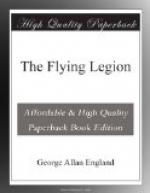This launch contained four men. They carried but little baggage; no more than could be stowed in a rucksack apiece. All were in their old service uniforms, with long coats over the uniforms to mask them. All carried vacuum-flashlights in their overcoat pockets, and lethal-gas pistols, in addition to ordinary revolvers or automatics. And all were keyed to the top notch of energy, efficiency, eagerness. The Great Adventure had begun.
In the stern of the swift, twenty-four cylinder launch—a racing model—sat Captain Alden and Rrisa. The captain wore his aviator’s helmet and his goggles, despite the warmth of the night. To appear in only his celluloid mask, even at a time like this when darkness would have hidden him, seemed distasteful to the man. He seemed to want to hide his misfortune as fully as possible; and, since this did no harm, the Master let him have his way.
The bow was occupied by the Master and by Major Bohannan, with the Master at the wheel. He seemed cool, collected, impassive; but the major, of hotter Celtic blood, could not suppress his fidgety nervousness.
Intermittently he gnawed at his reddish mustache. A cigar, he felt, would soothe and quiet him. Cigars, however, were now forbidden. So were pipes and cigarettes. The Master did not intend to have even their slight distraction coming between the minds of his men and the careful, intricate plan before them.
As the racer veered north, up the broad darkness of the Hudson—the Hudson sparkling with city illumination on either hand, with still or moving ships’ lights on the breast of the waters—Bohannan murmured:
“Even now, as your partner in this enterprise—”
“My lieutenant,” corrected the Master.
“As second in command,” amended Bohannan, irritably, “I’m not wholly convinced this is the correct procedure.” He spoke in low tones, covered by the purring exhaust of the launch and by the hiss of swiftly cloven waters. “It looks like unnecessary complication, to me, and avoidable danger.”
“It is neither,” answered the man at the wheel. “What would you have done? What better plan could you have proposed?”
“You could have built your own flyer, couldn’t you? Since money’s no object to you, and you don’t even know, accurately, how much you’ve got—nobody can keep track of figures like those—why risk legal interference and international complications at the start, by—”
“To build the kind of flyer we need would have taken six or seven months. Not all my money could have produced it, sooner. And absolute ennui can’t wait half a year. I’d have gone wholly stale, and so would you, and all of them. We’d have lost them.
“Again, news of any such operations would have got out. My plans would possibly have been checkmated. In the third place, what you propose would have been tame sport, indeed, as a beginning! Three excellent reasons, my dear Major, why this is positively the only way.”




